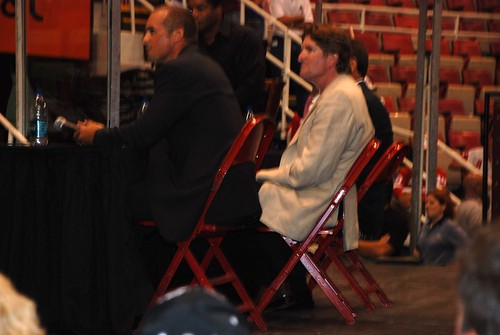Babcock talks Blue Jackets offseason improvements in Part 3 with NHL.com
Mike Babcock #MikeBabcock

Babcock ranks 12th in regular-season wins (700) and eighth in Stanley Cup Playoff wins (90) in NHL history. He has won the Stanley Cup (2008 with the Detroit Red Wings) and been to Game 7 of the Stanley Cup Final twice (2003 with the Mighty Ducks of Anaheim and 2009 with the Red Wings).
He coached the Toronto Maple Leafs from 2015-16 until he was fired 23 games into the 2019-20 season. His first season, they finished last in the NHL, but had pieces in place and selected center Auston Matthews No. 1 in the 2016 NHL Draft. By 2017-18, they had 49 wins and 105 points, team records at the time.
He also has won the IIHF World Junior Championship (1997), the IIHF World Championship (2004) and the Olympics twice (2010 and 2014) with Canada, and he has won the World Cup of Hockey (2016) with Team Canada too.
“You know his pedigree and what he has done in this league and through a number of years of coaching,” Jenner says. “He brings that experience to us. He’s obviously very intense and knows exactly how he wants to play, how he wants us to play and what we’re going to get out of each guy, so very exciting for us players.”
Werenski grew up in the Detroit area watching Babcock win with players like defenseman Nicklas Lidstrom and forwards Pavel Datsyuk and Henrik Zetterberg.
“He was a big reason for their success,” Werenski says. “Just excited to get it going and see what he’s all about. I think he’s going to get this team moving in the right direction quickly, and I’m excited for that.”
* * * * *
Let’s start with defense and goaltending.
The Blue Jackets ranked 31st in goals against per game (4.01) and 30th in 5-on-5 shot-attempts percentage (44.9) last season, and tied for 30th in 5-on-5 save percentage (.901). They were 25th in penalty-kill percentage (75.1).
But, again, injuries were a big reason, and now they’re healthy and have added Provorov and Severson. Babcock wants to add structure and more puck possession, and he wants goaltending coach Niklas Backstrom in each meeting for defensive-zone coverage and the penalty kill.
That should help goalie Elvis Merzlikins, who went 7-18-2 with a 4.23 goals-against average and an .876 save percentage last season.
“Suddenly, he’s a way better goalie because he knows where [the shots are] coming from,” Babcock says. “Then the other thing that happens to him is confidence.
“Confidence and mental health, they’re not the same thing. But once your confidence is shaken, how are you feeling? So now, how do you get your confidence back? It’s interesting. When you look at the teams that play with good structure in their own zone, how come their goalie’s save percentage is where it’s at?”
The Boston Bruins, who set NHL records for wins (65) and points (135) last season, led the NHL in 5-on-5 save percentage (.939). Linus Ullmark won the Vezina Trophy, voted as the NHL’s best goalie, after going 40-6-1 with a 1.89 GAA and .938 save percentage.
The Vegas Golden Knights, who won the Stanley Cup, had a 5-on-5 save percentage of .940 in the playoffs. Adin Hill, their third- or fourth-string goalie at the time, depending on how you look at it, played 16 games (14 starts) and went 11-4 with a 2.17 GAA and a .932 save percentage.
“Know where the shots are coming from,” Babcock says. “There’s a reason guys go someplace and suddenly they’re a way better goalie. That’s just the way it is. I think that in itself gives us all hope.”
Having Werenski back does too. The 26-year-old played 13 games last season before having shoulder surgery. He has trained hard with the goal of being among the best defensemen in the NHL.
“You can’t be one of the best guys if your engine doesn’t allow you to,” Babcock says. “You can have all the skill in the world, but your engine’s got to allow you to. He’s put in the work to have the engine ready to go. And so, to me, he now has to be a driver, a leader. … He’s at that age too. It’s time, and he knows it.”